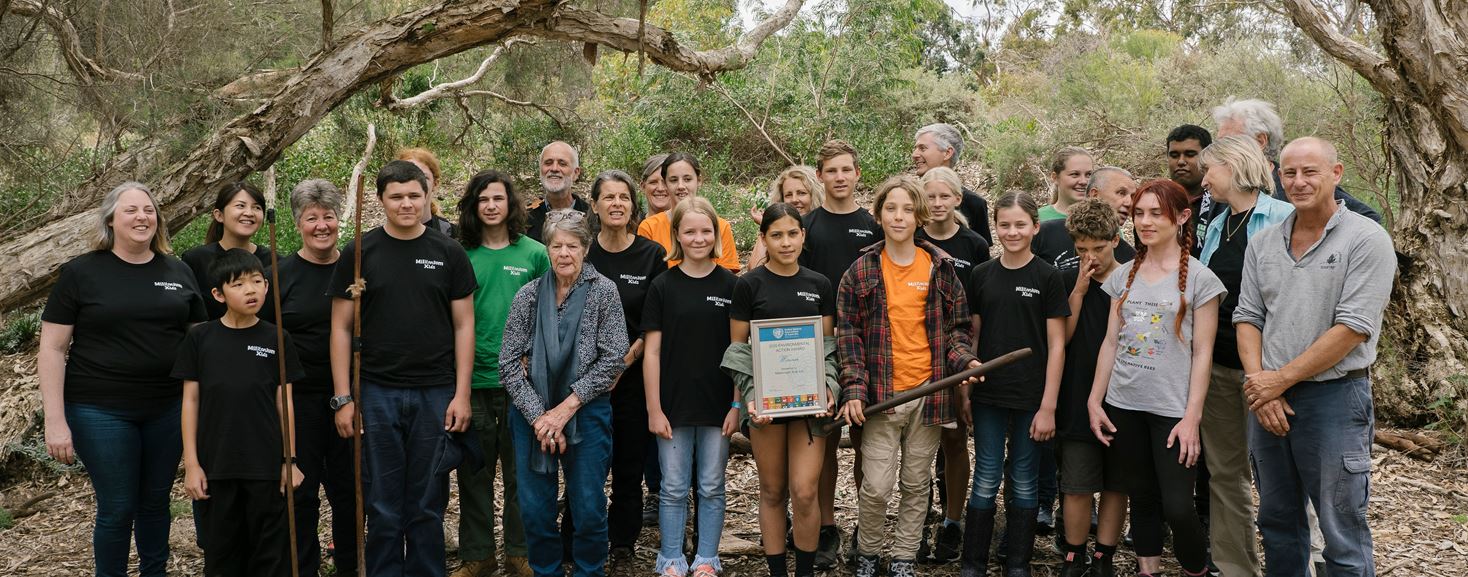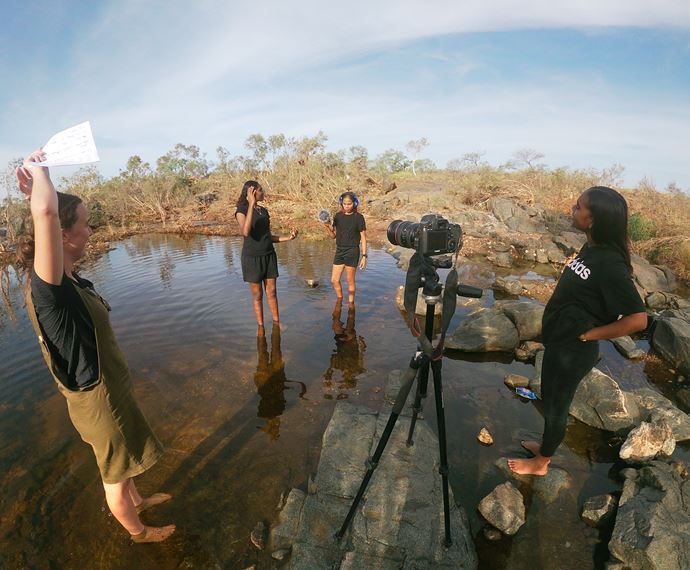Providing kids with a platform for positive impact
Millennium Kids empowers young people to explore, identify and address environmental and sustainability issues. Through education, advocacy, innovation and design, young people can transform their ideas from concept into practical action that can make a real difference in their community.
Through a Lotterywest grant, Millennium Kids were able to use the funding to develop their website and update their branding. The website gives young people a platform to connect and contribute to the 1,000 Actions for the Planet initiative while also contributing to the UN Sustainable Development Goals commitment.
To empower and connect young people in addressing environmental and sustainability issues through engaging and dynamic website and brand development.
Millennium Kids Inc.
1/1/2018
$50,640
Lotterywest
$38,000
State-wide
Young people
- Involving young people in the rebrand was instrumental, resulting in a youth website design and increased confidence in participants.
- Development of a new, agile website that showcased the philosophy and values of young people.
- Finding a team that would work effectively with and listen to young people was critical for the success of the project.
- Putting young people at the center of all decision making.
- An up-to-date website allows Millennium Kids to showcase their initiatives and for young people to connect online.
- Users can share tools for change with other young people around the world.
- The new website required increased monitoring, management of content and communication with users and mentors.

Opportunity
Young people are becoming increasingly aware of the impacts of climate change and the role they can play in accelerating climate action. By engaging them in issues and giving them a platform to address climate change, we can empower them to be leaders and change makers in their communities.
Education, particularly in STEM subjects, has traditionally sought to create leaders for the future; however, in the context of climate change and sustainability challenges, rapid societal transformation is required [1]. The intergenerational impacts of these issues mean that young people have a legitimate place in the policy debate and in envisaging and enacting more sustainable futures [1] [3].
While there is interest in acting on climate change, research has also shown that there is a hurdle in moving people from abstract concern about the environment to concrete actions [2]. Additionally, young people may feel overwhelmed by the scale of the issue, leading to disengagement. That is why action-focused engagement strategies that enable young people to feel capable by developing meaningful activities, particularly in a local, collective setting, can deliver significant positive outcomes [1].
Approach
Led by 12-year-old Jacob Cassey, a Millennium Kids Youth Board member, the purpose of the rebrand and website development project was to engage young people in a range of issues, and support and encourage their ideas for action. Jacob was involved from the beginning, taking part in a workshop with over 100 other young people to decide the future of Millennium Kids and develop the organisation’s strategic plan Transition 2020.
Jacob put his hand up to lead the brand and website redevelopment component of the transition based on the organisation’s aim to align with the UN Sustainable Development Goals and create 1,000 actions for the planet. Jacob was also involved in the development of the grant, meeting and liaising with the website designer and reporting back to the Youth Board and Council.
Through a members’ portal, the website allows young people to pitch project ideas and get mentor support to assist them from project development to project completion. Once underway, the projects are then promoted on the public facing website, inspiring others to take action.
Impacts and outcomes
Involving young people in the process of the project was instrumental, resulting in a youthful rebrand and website design, while also allowing them to build skills and confidence.
“It did help with my confidence, being in the middle and being like the reporter for each side”
Jacob Cassey [4]
The Millennium Kids rebranded, developed a new website and created content that showcased their philosophy and values in a way that demonstrated the organisation’s continued relevance. The website is agile, reflecting the organisation’s purpose, mission, and youthful vibe.
One action supported through the platform was the Mandurah Youth-Led Deliberation on Climate Change in 2021. Participants worked collectively to reflect on how they might tackle climate change and support positive outcomes for their communities.
Millennium Kids facilitates policy advocacy by collecting information on the priorities of young people. Since the website launched in 2019, the organisation has supported hundreds of actions proposed by young people. These actions tackle issues including:
- Climate change
- Waste
- Energy
- Animals
- Water
- Peace and lifestyle
- Plants
- Air and transportation
At the website launch, Millennium Kids Youth Board member Rachael was able to present their findings around attitudes towards the environment from young people across the state to the Minister for Environment.
Millennium Kids has been recognised for its work through various awards, winning the 2020 National Banksia Award for Community and Charity, and featuring in the Top 14 of the World Economic Forum’s Uplink Innovator program.
What worked
Finding a team that would work effectively with young people
Millennium Kids has youth at the centre of all decision making, so finding a website designer and brand team that would listen to the young people involved was crucial to the project’s success.
Online platform increased visibility and connections
Having an up to date, engaging website allows Millennium Kids to showcase their youth-led initiatives and allows young people to connect online, share ideas and promote change. Users have been able to share tools for change and connect with other young people not only in Western Australia but across the country, in Indonesia and the UK.
“We have become visible to local, regional and international stakeholders which has resulted in new partnerships and collaborations.”
Catrina Luz Aniere, CEO Millennium Kids
Key challenges
Factoring in human resources for ongoing management
The new website required increased monitoring, management of content and communication with users and mentors. It also increased traffic to Millennium Kids offices. Having a dedicated resource onboard from website launch would have assisted the organisation with this extra workload.
REFERENCES
- Trott, C. D., & Weinberg, A. E. (2020). Science Education for Sustainability: Strengthening Children’s Science Engagement through Climate Change Learning and Action. Sustainability, 12(16), 6400. https://doi.org/10.3390/su12166400
- Hornsey, M. J., & Fielding, K. S. (2020). Understanding (and reducing) inaction on climate change. Social Issues and Policy Review, 14(1), 3–35.
- Hadjichambis, A. C., & Paraskeva-Hadjichambi, D. (2020). Education for environmental citizenship: The pedagogical approach. Conceptualizing Environmental Citizenship for 21st Century Education, 237.
- Anthony, G, & Ryan, K. (2019, May 23). Millennium Kids website takes on biggest issue of the era — climate change. The West Australian. https://thewest.com.au/news/wa/millennium-kids-website-takes-on-biggest-issue-of-the-era-climate-change-ng-b881199109z
Learn about wellbeing
Understand how your community is going to help you to better target and plan your project.
Ready to plan your project?
Understand your vision, plan your impact and report on the outcomes of your project with three easy interactive tools in the Community Impact Planner.
Acknowledgement of Country
The Western Australian Community Impact Hub acknowledges and pays respect to the Traditional Owners of the land on which we are based, the Whadjuk people of the Noongar Nation and extends that respect to all the Traditional Owners and Elders of this country. We recognise the significant importance of their cultural heritage, values and beliefs and how these contribute to the positive health and wellbeing of the whole community.


![P1080096[1]](/media/gt3ban2e/p1080096-1-resized.jpg?anchor=center&mode=crop&width=690&height=570&rnd=133051338125000000&quality=80)